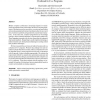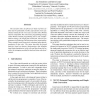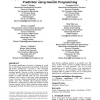158 search results - page 7 / 32 » Predicting defects with program dependencies |
109
click to vote
POPL
1994
ACM
15 years 6 months ago
1994
ACM
Modern computer architectures increasingly depend on mechanisms that estimate future control flow decisions to increase performance. Mechanisms such as speculative execution and p...
129
click to vote
MICRO
2000
IEEE
15 years 6 months ago
2000
IEEE
Value prediction breaks data dependencies in a program thereby creating instruction level parallelism that can increase program performance. Hardware based value prediction techni...
117
click to vote
WORDS
2003
IEEE
15 years 7 months ago
2003
IEEE
The execution time of software for hard real-time systems must be predictable. Further, safe and not overly pessimistic bounds for the worst-case execution time (WCET) must be com...
112
click to vote
EUROPAR
2007
Springer
15 years 8 months ago
2007
Springer
Computer systems are increasingly parallel and heterogeneous, while programs are still largely written in sequential languages. The obvious suggestion that the compiler should auto...
129
click to vote
GECCO
2007
Springer
15 years 8 months ago
2007
Springer
The accurate quantification of proteins is important in several areas of cell biology, biotechnology and medicine. Both relative and absolute quantification of proteins is often d...



